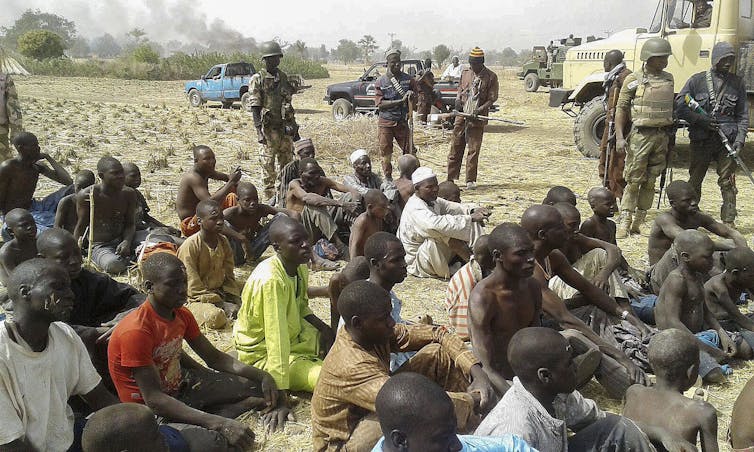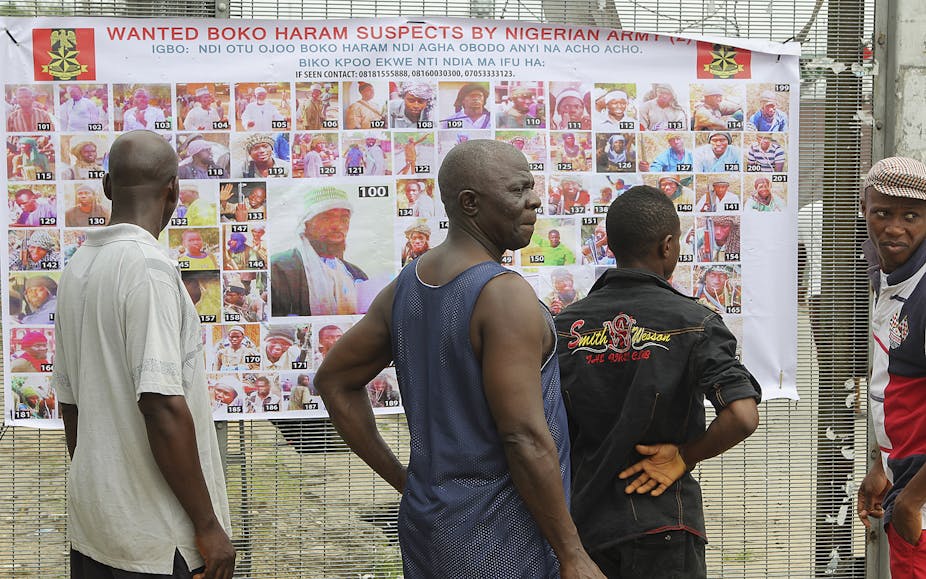It is just over a year since General Muhammadu Buhari swept to power amid promises to the Nigerian people that he would succeed where his predecessor Goodluck Jonathan had failed – by defeating the Islamist militant group Boko Haram.
Buhari’s approach has been twofold: he has pursued a determined military onslaught against Boko Haram and taken some significant steps to boost security in the most affected northeastern states. And he has started rooting out corruption in the military.
On Jonathan’s watch, three Nigerian states – Adamawa, Borno and Yobe – were placed under a state of emergency because of the deadly insurgency. Several communities in these states had fallen to the terrorist group. Millions of people have been internally displaced, sheltering in refugee camps within Nigeria. Others have fled to neighbouring states.
On taking office the former military leader-turned-president set December 2015 as the deadline within which to conclusively obliterate Boko Haram. Despite the bold steps he’s taken, the insurgents remain undefeated six months after the deadline expired.
Instead, they have brazenly engaged the Nigerian military in direct combat resulting in the deaths of people. They have also taken to detonating explosives in public places – including suicide attacks in northeastern towns in Nigeria including Zaria, Malari, Potiskum and Zambari Muna near Maiduguri.
Despite the intransigence and deadly attacks, some progress has been made since Buhari assumed office. But more needs to be done.
As unpalatable as it may seem to many, the Nigerian government cannot shy away from the fact that it will need to sit down with Boko Haram and begin the process of peace building. After all, there are precedents in Colombia and Northern Ireland and elsewhere, where deadly foes eventually met to make peace.
What’s been done so far
In his inaugural address as President of the Federal Republic of Nigeria on May 29 2015 Buhari ordered the relocation of the army headquarters from Abuja to Maiduguri, capital of Borno State, in the heart of the insurgency. He pledged that the army headquarters would remain there until Boko Haram was defeated.
The president also reorganised the military in an effort to end corruption and restore the dented image of the Nigerian army. He replaced top military commanders deemed to have either corruptly enriched themselves with funds meant for military, or who had acted unprofessionally by indulging in politics.
The move lifted the morale of despondent soldiers who had been deprived of essential equipment, often due to the corruption and greed of their superiors. The new commanders also set to work restoring the army’s battered image.
The “cleansing” of the military afforded Nigeria the opportunity to reestablish trust with leading states in the global fight against terrorism, notably France, the United Kingdom and the US. All pledged their support in sharing intelligence information with the new administration in its effort to defeat Boko Haram.
Another plus was that cross border Boko Haram activities saw Nigeria and its neighbours put aside their longstanding border disputes to confront their common enemy. The terrorist group now finds itself facing an 8,700-strong multinational joint task force composed of soldiers from Benin, Cameroon, Chad, Niger and Nigeria.
The military offensive has succeeded in the recapture of territories previously held by the militants. It’s important to note, though, that some of the feats of success occurred a few weeks into Buhari’s administration. This was due to the pre-electoral security measures put in place by the Jonathan administration.
Thus, one year after Buhari became president, the terror acts that made Boko Haram the deadliest terrorist group in the world have been significantly contained – largely thanks to the multinational joint task force’s efforts. But the menace has yet to be totally eliminated.
Attacks on communities in the northeastern states – where people now face famine – and communities in Cameroon and Chad, which border with Nigeria, continue. A number of issues still need to be addressed.
So far only two out of the more than 200 kidnapped Chibok girls have been rescued by the Nigerian military. Most of the girls are still being held in the fortress of the militants – the Sambisa forest.
Buhari has pledged his government’s resolve to negotiate the release of the girls since he assumed office. But there is no evidence of progress. In addition, thousands of people are still displaced, both internally and externally. And the militants continue to attack communities.

The insurgency also continues to have a debilitating effect on the livelihoods of the people living in the three most heavily affected northeastern states, and hopelessness reigns.
Let peace building begin
The war is certainly not over, and it is puerile to assume that war against terrorism can be won with only military might.
It is indeed obvious that military power has not succeeded in eliminating global terrorism. In Nigeria, no matter what the challenges associated with the intransigence of militants are, the political strategy suitable for getting the country back is effective peace building. Admittedly, this is not the preferred approach of the global hawks in the fight against terrorism
The challenge is that peace building takes longer to fully realise its objectives. But Buhari would do well to follow the advice of the 19th century Prussian military strategist, Carl Von Clausewitz. He famously asserted that warfare was a continuation of politics by other means:
We see, therefore, that War is not merely a political act, but also a real political instrument, a continuation of political commerce, a carrying out of the same by other means.
British prime minister Winston Churchill remarked:
To jaw-jaw is always better than to war-war" (and) In war, resolution; in defeat, defiance; in victory, magnanimity.
These point to one thing – peacemaking. Their argument is simple: military action alone is not sustainable and risks failing unless it is founded on a concrete political strategy that sustains it.
What would it involve? A peace process would provide amnesty for former combatants as well as their reintegration into the civilian life. It would also provide for a process of reconciliation.
In the case of Nigeria, it would also require the provision of socioeconomic opportunities for the devastated northeastern states, which are important for sustainable peace to be achieved in the long run.
The President’s decision to negotiate for the release of the Chibok girls is the first peace overture to be extended to the militants. The government needs to follow through with it and not relent, no matter the difficulties.

